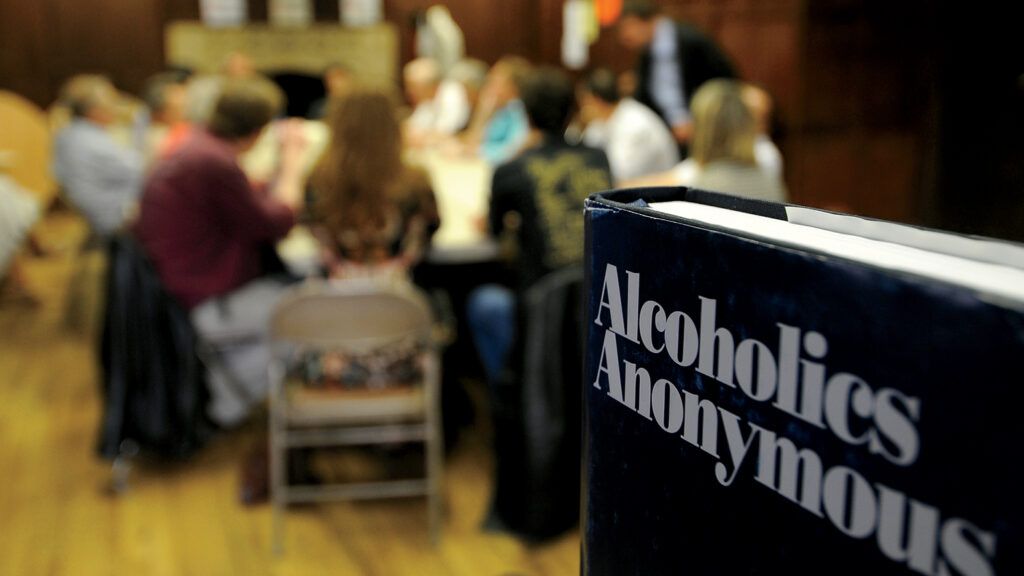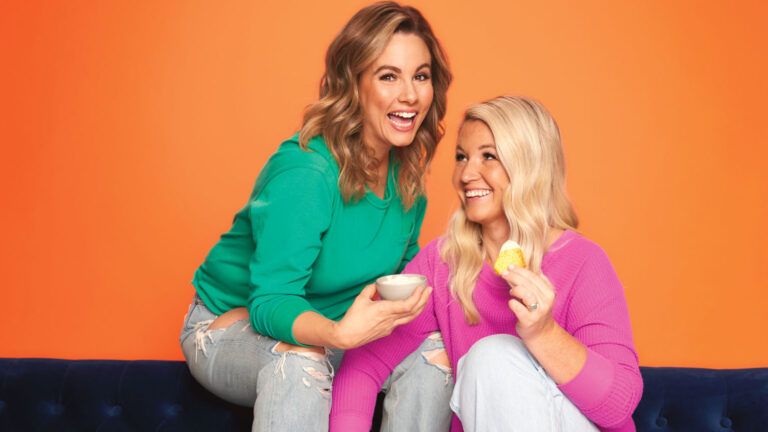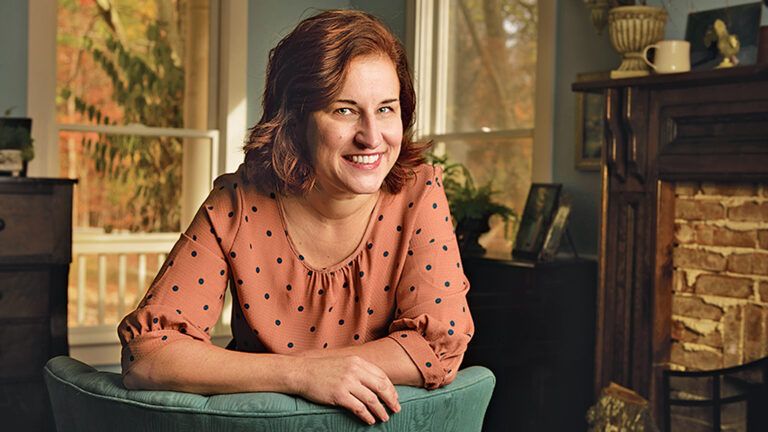I can’t believe I got roped into doing this, I thought. Downtown Greensboro, North Carolina, was covered in holiday decorations, but I didn’t feel cheery. Why did I have to go so far out of my way? The houses got smaller and smaller the farther north I drove. I scanned street signs along Summit Avenue. I kept driving and made a right turn into a 1940s postwar development. I recognized a large gray Buick in the driveway of one house and pulled in.
Waiting just inside the storm door—ready to go—was Cindy. Cindy with her short hair and plastic-framed glasses that sat crooked on her nose. Cindy with the three kids from a previous marriage. Cindy who always gestured to the empty seat beside her when I came late to AA meetings.
The Buick belonged to her new husband. I’d seen her climb into it after meetings. Her toddler son was always strapped in a car seat in the back. Watching them drive away filled me with mixed emotions. On the one hand, I was a little envious that Cindy had someone to support her. Even if it was some unremarkable guy. I felt as if I didn’t have anyone. On the other hand, I did have my freedom. I wasn’t beholden to anyone.
Unlike many alcoholics, I’d avoided getting a DUI. I still had my driver’s license and a car. I didn’t need anyone to take me anywhere. I could still do my own grocery shopping. I could still get to my job as an English teacher at a community college. But now my sponsor had asked that I drive Cindy to AA over my Christmas break from school. She thought it would help distract me from what I really wanted—a romance.
Dating is a big no-no for newly sober people. It’s easy for addicts to obsess over a budding relationship. When it doesn’t work out—and it often doesn’t—many people pick up again. Rejection is a huge trigger. But I’d been sober for a whole year now, since December 1986. I’d stopped hanging out with all the big drinkers from my graduate program in Greensboro, where I’d dropped out. I diligently went to AA meetings even though my mother—a high-functioning alcoholic herself—turned up her nose at “those kinds of people.” Look at all the progress I’d made! Didn’t I deserve a chance at happiness? Didn’t a person need a partner to have a full life? Surely my sponsor would give me the green light.
I’d called my sponsor two weeks before Christmas. “I think I’m ready for a relationship.”
There was a pause. “I’ll call you back in a few minutes.”
The phone rang five minutes later. My sponsor told me that I would be in charge of getting Cindy to and from meetings. Ugh, I thought. Really? That’s your answer? Even though we were the same age—26—Cindy and I weren’t exactly close. How could we be? I was educated and from a middle-class family. Cindy was from somewhere up in the mountains and hadn’t even finished high school. I had lived in New York City and worked in publishing. She had painted houses and done drugs.
I knew from meetings that her first husband had died in some sort of accident. I had never been married and didn’t have any kids. We just weren’t on the same path. This new errand, I reasoned, was punishment for my hubris, for thinking I was ready for a real relationship.
Cindy buckled herself into my car. “This is the first time I’ve gone to a meeting without my husband driving me,” she said as I backed out of her driveway. “Thank you.”
I nodded. I knew how our arrangement benefitted Cindy. What good would it do for me?
I parked in the lot of a large downtown church, and we walked into the fellowship hall together. We found seats in the back. I usually sat alone, but now here was Cindy—right next to me like a shadow. There are basically two kinds of meetings in AA: speaker meetings and discussion meetings. This was a speaker meeting, where the speaker describes their experiences with alcohol, how they came to AA and how their lives have changed since turning them over to a higher power. I listened as one woman told her story.
“I felt alone before AA,” she said. “But now I have a community. I go out of my way to help others.”
I caught my sponsor’s eye. She smiled, as if to say, See? It’s good to focus on something outside yourself.
I continued driving Cindy throughout Christmas break. I wasn’t exactly happy about it, but we settled into a kind of routine. We chatted about her husband and her son. She asked me about being a teacher. She seemed impressed with my education. I sure as heck wasn’t—all this schooling and look where it landed me. Right next to Cindy.
“You know, I’ve been watching you this past year,” she said as we headed downtown one day. “You looked so hopeless when you first came in. Your head was down. You cried all the time and didn’t speak.”
I remembered how I had moved through AA for all those months like a woman invisible. I figured nobody but me cared I was there. Yet I was trying so, so hard. All those months of feeling alone, and Cindy had been watching me the whole time. Like a kind of guardian angel in crooked glasses. I felt guilty for ignoring her for so long. Seeing, I knew, was also a kind of love. She’d cared enough to see me. Had I seen her? Or was I more like my mother, disdaining “those people”?
“You’re doing better now. Don’t you think?” Cindy asked.
“Yeah,” I said as we turned into the church lot. “I am.”
Cindy told me more of her story Christmas week. It felt good to be trusted. To think about someone else’s problems for a change. It was healing to get outside my own head. On the Tuesday before Christmas, she started talking about her first husband. “He was killed on a job site,” she said as she folded her hands in her lap. “He was working on part of the Blue Ridge Parkway, and he drove off a cliff. Suicide maybe. No one knows.”
“Oh, Cindy,” I said. “I’m so sorry.”
She was ashamed of how she’d responded to his death, drinking and using. She just couldn’t deal with the grief. She’d left her kids with relatives and come to Greensboro to make money painting houses. “I wish my kids could see me now,” she said. “Sober.”
“Can’t your husband take you to see them?” I asked.
Cindy shook her head. “He doesn’t want to take me home.” I pulled into her driveway and turned off the car. She deserves better than this, I thought. Everyone deserves a chance at happiness. I’d been wrong about Cindy. She wasn’t some know-nothing high school dropout. She was someone who had mourned a huge loss. Who had tried to do right by her family. Someone who had—despite her best efforts—lost her footing.
I thought about the years I’d spent working in New York. The out-of-control drinking that led me to make the bad decisions that eventually got me fired. About leaving New York in search of a graduate degree and a better life in Greensboro. Cindy was someone all right, someone like me. A recovering alcoholic trying to stay sober one day at a time by the grace of God.
“Can I ask you a favor?” she said. “Would you drive me to see my boys? I want to bring them presents.”
Something ran through me like lightning. A feeling that had lain dormant for far too long. The joy of getting to help someone else. To become part of their story. To be of service. I’d been wondering what driving Cindy would do for me and, without realizing it, been transformed. From the young woman crying in AA meetings to a person that Cindy could rely on. It hadn’t been a romance that I needed but an unexpected friendship.
I wasn’t alone. I had Cindy, and she had me.
“Of course,” I said, smiling. “Do you want to go tomorrow?”
For more inspiring stories, subscribe to Guideposts magazine.





